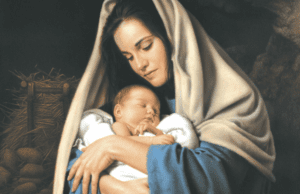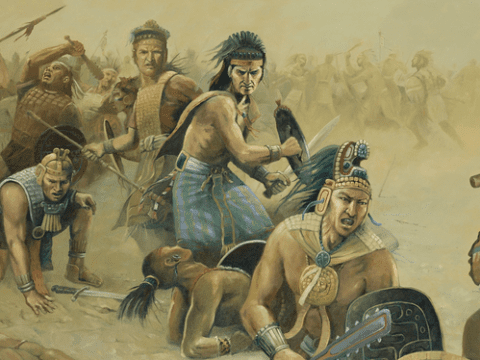In the final week of Christ’s life, we see more of an ongoing theme in which Christ reveals to us the importance of, and His love for, the people we are likely to overlook or even shun. Christ helps us see that their lives matter, that they are important to Him, and so they should be important to us. In that final week, He teaches us about His love for these overlooked people in several interactions.
First, as he is moving toward Jerusalem through Jericho, he encounters Zacchaeus. (An excellent discussion of Zacchaeus and also Simon the Leper, mentioned below, is found in Episode 202 of the Talking Scripture Podcast by Mike Day and Bryce Dunford.) This man, a Jew, is among the most scorned and despised classes of people, for he is a publican, and in fact, according to Luke 19:2, he was chief among the publicans, one of the people hired by the evil empire of Rome to carry out various administrative tasks such as collecting taxes. Most translations simply call him the chief tax collector. In the eyes of captive Israel, he was a traitor, working for the enemy and taking their property away. Further, as Luke 19:2 also reports, “he was rich,” which made it easy for the Jews to assume that his wealth came from corruption and over charging people. Christ, however, reached out to this man with great kindness:
1 And Jesus entered and passed through Jericho.
2 And, behold, there was a man named Zacchaeus, which was the chief among the publicans, and he was rich.
3 And he sought to see Jesus who he was; and could not for the press, because he was little of stature.
4 And he ran before, and climbed up into a sycomore tree to see him: for he was to pass that way.
5 And when Jesus came to the place, he looked up, and saw him, and said unto him, Zacchaeus, make haste, and come down; for to day I must abide at thy house.
6 And he made haste, and came down, and received him joyfully.
7 And when they saw it, they all murmured, saying, That he was gone to be guest with a man that is a sinner.
8 And Zacchaeus stood, and said unto the Lord: Behold, Lord, the half of my goods I give to the poor; and if I have taken any thing from any man by false accusation, I restore him fourfold.
9 And Jesus said unto him, This day is salvation come to this house, forsomuch as he also is a son of Abraham.
10 For the Son of man is come to seek and to save that which was lost. (Luke 19:1-10)
Then, two days before the Passover, He would dine in the house of another man in Bethany next to the Mount of Olives by Jerusalem, a city of great rulers and great wealth. Whose house was it? Matthew 26:6 reports that it was “the house of Simon the leper.” A leper? We don’t know anything about him, but presumably this was a leper who had been healed, perhaps by Jesus. Out of all the places he could have spent time, to be in the house of Simon the Leper may be teaching us the same thing we learn in His choice of the much-despised Zacchaeus the chief publican, whom he reached out to and dined with in his final days. These overlooked people may be gems in the Lord’s eyes who have much to teach us about faith, hope, and charity.
In the house of Simon the Leper, Christ would be anointed with a precious oil called spikenard – anointed in anticipation of his burial, but perhaps also symbolically of his enthronement as King and Lord. This anointing would not be done by the great High Priest of Jerusalem, who, sadly, wanted him killed, but by a woman, Mary of Magdalene, who had once been possessed by seven devils. The accounts in Matthew 26 and Luke 19 don’t give her name, but John makes that connection in John 11:2. It may be significant that this anointing was not only done by a woman instead of a conventional high-ranking member of the priesthood, but by a woman who surely had been shunned and avoided as unclean and demonic, who once had been possessed or apparently crazy. But Christ had healed her, casting out seven devils – whether real demons or severe mental illness or something else, He had changed everything and helped her move forward in her life, becoming a devout and faithful disciple of Christ, a close friend, and the first witness of His majestic Resurrection. The least of women, and the first of humanity to see and embrace the risen Lord. I say “embrace” because while our KJV reports Christ telling her to “touch me not,” the Joseph Smith translation changes that to “Hold me not,” which seems to be consistent with the Greek that may be translated as “Do not cling to Me” (per the New KJV), “Stop clinging to Me” (NASB20), and “Do not hold on to me” (NIV). It seems natural that when Mary recognized His voice as he called her name, she threw her arms around him in tearful joy.
Zacchaeus, Simon the Leper, Mary of Magdalene – people overlooked by the world, but important to the Lord.
After Christ had begun the suffering for the sins of mankind in the Garden of Gethsemane, taking on Himself pain so great that it caused great drops of blood to ooze from every pore, as Luke records, he would soon be approached by Roman soldiers with the help of Judas Iscariot. As they came to take him, Peter rashly sought to defend the Lord with his sword, slicing off the ear of a Roman soldier. Christ rebuked Peter and then reached out and healed the ear of the unnamed soldier. A foreigner, a Gentile, an armed enemy, an oppressor, come to unjustly take away the Lord with force, and yet the Lord paused to right a wrong from one of his followers and to show mercy to an obvious enemy. Again, a person we might naturally despise, was the subject of miraculous compassion in the last hours of Jesus, the last miracle before the Lord’s own miraculous triumph over death. Did that healing later lead that soldier to turn his ear to the healing words of the Gospel? Did he become one of the Saints back in Rome? It’s possible. I hope it turnout out that way. Our enemies, those we are tempted to slash at with swords or sharp words, can sometimes be healed with the miracle of compassion, and turn their ears to the Lord. This is another example of the Lord reaching out to people that were overlooked or shunned in the society of His day.
But there were further examples not just in the final days of Christ’s mortal ministry, but the final minutes. To his side, as he suffered unspeakable pain on the cross, being tortured in a vicious way saved for the most despised of society, such as murderers and traitors, the most pure, righteous, and innocent Being ever to walk the planet was suffering between two criminals also being crucified. As we read in Luke 23, one of them mocked him, using language similar to Satan’s words when he tempted Christ, and copying taunts from others as he suffered (see vv. 35, 37) : “If thou be Christ, save thyself and us” (vs. 39).
40 But the other answering rebuked him, saying, Dost not thou fear God, seeing thou art in the same condemnation?
41 And we indeed justly; for we receive the due reward of our deeds: but this man hath done nothing amiss.
42 And he said unto Jesus, Lord, remember me when thou comest into thy kingdom.
43 And Jesus said unto him, Verily I say unto thee, Today shalt thou be with me in paradise.
He did not say he would be in heaven and was now saved, but that he would be with Christ in the spirit world that day. Christ would not ascend to heaven until three days later, when he told Mary, “Touch me not, for I have not yet ascended to my Father” (John 20:17) but would be in the spirit world, where he would initiate the great ministry of preaching to the dead, an important part of early Christianity and a vital message of the Restored Gospel of Jesus Christ. But here, on the cross, we have a sweet example of Christ’s love for the people we overlook or shun. In this case, it was a criminal who had been condemned to death for genuine crimes – yet Christ was kind to him, spoke to him in mercy, and hinted at the hope that lay ahead of him. In the spirit world, this penitent man would behold the Savior and there presumably could begin learning more about the hope that the Atonement of Christ brings to all who will receive him.
We’ve mentioned Mary Magdalene, Zacchaeus the chief tax collector, Simon the Leper, a Roman soldier, and a criminal being executed for his crimes. But there is one more easy-to-overlook person we should consider, whom Christ also paid special attention to.
While Christ was being tried in a corrupt court by hateful, corrupt officials seeking his blood, some of his apostles scattered in fear. The Chief Apostle, Peter, would deny him three times and weep bitterly when he realized what he had done I cowardice and betrayal. As far as we can tell, all of the apostles except John were in hiding – it was a very dangerous moment to be a disciple. But some of his most loyal disciples did not scatter and were there standing before the cross, willing to be at the terrible scene, not fleeing at the horror of what was happening, not sleeping as the apostles had in Gethsemane, not denying their acquaintance with the Lord. John mentions several of them in John 19 that had something in common: they were women, and three were named Mary. Why were they there? Mathew 27:55 says they had come with him from Galilee – a long ways away, “ministering to him” or, as other translations put it, “caring for his needs.” These female disciples continued to do what they could for Jesus by being there for him. John turns our attention specifically to that Mary who was his mother. Here is how the Apostle John describes the closing scene of Christ’s mortal ministry in John 19:
25 Now there stood by the cross of Jesus his mother, and his mother’s sister, Mary the wife of Cleophas, and Mary Magdalene.
26 When Jesus therefore saw his mother, and the disciple standing by, whom he loved, he saith unto his mother, Woman, behold thy son!
27 Then saith he to the disciple, Behold thy mother! And from that hour that disciple took her unto his own home.
28 After this, Jesus knowing that all things were now accomplished, that the scripture might be fulfilled, saith, I thirst.
29 Now there was set a vessel full of vinegar: and they filled a spunge with vinegar, and put it upon hyssop, and put it to his mouth.
30 When Jesus therefore had received the vinegar, he said, It is finished: and he bowed his head, and gave up the ghost.
So from John’s account, the closing act of Christ’s mortal ministry was to take care of His mother. Christ’s brain was being overwhelmed with the screech of nerves calling out in alarm with incredible pain. Organs were beginning to fail. Breathing was becoming impossible, every breath requiring lifting his body against the pain in his limbs. Death was imminent. On top of this physical agony from nails and wood, skin-splitting lashes, the piercing of thorns as well, with great thirst and physical shock, he had just taken upon him the ugliness and pain that each mortal being in the history of this planet had caused, taking all our pain upon him – nobody, none of us, had ever come close to being so overwhelmed by so much pain and such heavy burdens. He had enough to worry about, enough to cope with, as an infinite atonement for all of us was being completed. And in that utterly overwhelming moment, in what must surely count as a miracle of compassion, He managed to turn His selfless attention to His mother and her temporal welfare, taking time to make arrangements for her ongoing care. The final class of overlooked people that Christ reached out to in his final days and, indeed, with his final breaths, was mothers, exemplified by His compassion for His own mother, the sweet, tender, and ever faithful Mary, there in the background, there to minister to the great Minister or all, a woman easily overlooked, but of great importance to the Lord.

Gaye Strathearn of BYU published “Mary, the Mother of Jesus” in the Jan. 2019 Ensign. She notes that Mary must have been perplexed and confused by being selected for her sacred role. “Yes, she was from the house of David (see Luke 1:32; Romans 1:3), but that meant little under the Roman occupation. After all, she was just a young woman from a peasant family, living in an insignificant village” of which Nathaniel would later ask, “Can there any good thing come out of Nazareth?” (John 1:46). It was not her wealth and social status among the elite in society that made her one of the most magnificent of all women and “the only one whose life and ministry were prophesied about centuries before her birth (see 1 Nephi 11:15, 18; Mosiah 3:8; Alma 7:10).”
These prophecies include that of Nephi in 1 Nephi 11, as he sought to understand what his father Lehi had seen in his famous vision of the tree of life. Nephi was blessed to be visited by an angel and essentially have a tour of Lehi’s vision with some added commentary – a remarkable experience, one that connected Mary to the concept of the love of God. Dr. Matthew Bowen, a remarkable and prolific scholar who has published much about the Book of Mormon, with many great articles in Interpreter: A Journal of Latter-day Saint Faith and Scholarship, discussed Mary in his 2015 article, “‘Most Desirable Above All Things’: Onomastic Play on Mary and Mormon in the Book of Mormon”:
When Nephi was granted his “desire” and “saw the things which [his] father saw,” he immediately “beheld a tree … like unto the tree which [his] father had seen” (1 Nephi 11:8). Nephi’s second “desire” (11:10) was expressly “to know the interpretation thereof” (11:11), whereupon he saw Mary bearing the Christ child in her arms (11:20). Nephi’s angelic guide then asked him: “Knowest thou the meaning of the tree which thy father saw?” (11:21), to which Nephi responded, “Yea, it is the love of God which sheddeth itself abroad in the hearts of the children of men; wherefore, it is the most desirable above all things” (11:22; emphasis in all scriptural citations hereafter is mine). As Daniel C. Peterson has noted, “it was only when she [Mary] appeared with a baby and was identified as ‘the mother … of God’ that Nephi grasped the tree’s meaning.”2 At that point, Nephi understood that the “love of God” that was “most desirable above all things” had its fullest expression in Christ’s incarnation through Mary whose name evidently derives from the Egyptian root mr(i) “love,” “desire,” “wish.”
He’s talking about a possible clever word play on the meaning of Mary’s name in Nephi’s vision and in later prophecies that mention her. Mary is a symbol of the love of God, and also represents the love of a mother for her child. Her love for Him was expressed throughout her life, as we see her still there, following Him to help care for Him as He neared the end, and as we see her standing at the cross, grieving for her son.
The story of Christ’s mortal ministry nears an end with these words as the Lord faces an incredibly terrible and painful burden: “O my Father, if it be possible, let this cup pass from me: nevertheless not as I will, but as thou wilt.” (Matthew 26:39) or as Luke has it, “not my will, but thine, be done” (Luke 22:42). Then, upon realizing that it was the Father’s will that He should go forward with the pain of the infinite sacrifice required for the Atonement, Matthew records: “He went away again the second time, and prayed, saying, O my Father, if this cup may not pass away from me, except I drink it, thy will be done” (Matthew 26:42).
The story of Christ’s mortal ministry essentially begins with these words of Mary: “Behold the handmaid of the Lord; be it unto me according to thy word” (Luke 1:38). An agreement to accept the will of the Lord – not just at an intellectual level, but in a very real, physical way that would bring discomfort, great pain, much toil, and change her life dramatically. She would take on a frightening burden – bearing a child, and apparently being pregnant out of wedlock, with the risk of scorn and rumors, raising the fear that her fiancé Joseph would abandon her.
Christ’s mortal ministry was made possible by a faithful woman willing to accept the criticism of the world to do what was important in the eyes of the Lord. Numerous mothers in our midst are in similar situations – criticized for taking time out of their precious career to raise children instead of the glorious, fulfilling task of preparing PowerPoint slides for a quarterly report on sales of a product that everyone will forget in six months. But for those who really want to change the world, what could possibly be more important than raising, nurturing, and truly preparing a child so that they have a decent chance of becoming a joyous human being, one who trusts and loves the Lord Jesus Christ? Loving and raising a child never guarantees the outcome, but that service is divine work that is worth the sacrifice that each child requires of its parents.
In spite of having a national holiday called Mother’s Day and in spite of all the money spent on high profit-margin retail products for this day, I worry that mothers are increasingly overlooked and disrespected, and that the sacred role of motherhood is increasingly scorned and shunned. So-called experts and authorities increasingly question the right of parents to raise their children according to their values, and children are increasingly encouraged to disrespect their parents, to question the values of their patents, and to look to other sources for guidance that do not have the best interests of the child at heart. The Gospel of Jesus Christ actually gives us a completely opposite perspective to that of the world. Motherhood and fatherhood matter, far more than the world can comprehend. Families matter and can be eternal. Family relationships matter. Not everyone will be able to raise children in this mortal world, but all of us are meant to be united in eternal families and can have all the highest blessings that the Lord has to offer His children.
Here are a few portions from “The Family: A Proclamation to the World” that might be worth pondering more deeply:
In the premortal realm, spirit sons and daughters knew and worshipped God as their Eternal Father and accepted His plan by which His children could obtain a physical body and gain earthly experience to progress toward perfection and ultimately realize their divine destiny as heirs of eternal life. The divine plan of happiness enables family relationships to be perpetuated beyond the grave. Sacred ordinances and covenants available in holy temples make it possible for individuals to return to the presence of God and for families to be united eternally.
The first commandment that God gave to Adam and Eve pertained to their potential for parenthood as husband and wife. We declare that God’s commandment for His children to multiply and replenish the earth remains in force. We further declare that God has commanded that the sacred powers of procreation are to be employed only between man and woman, lawfully wedded as husband and wife.
We declare the means by which mortal life is created to be divinely appointed. We affirm the sanctity of life and of its importance in God’s eternal plan.
Husband and wife have a solemn responsibility to love and care for each other and for their children. “Children are an heritage of the Lord” (Psalm 127:3). Parents have a sacred duty to rear their children in love and righteousness, to provide for their physical and spiritual needs, and to teach them to love and serve one another, observe the commandments of God, and be law-abiding citizens wherever they live. Husbands and wives—mothers and fathers—will be held accountable before God for the discharge of these obligations.
The family is ordained of God. Marriage between man and woman is essential to His eternal plan. Children are entitled to birth within the bonds of matrimony, and to be reared by a father and a mother who honor marital vows with complete fidelity. Happiness in family life is most likely to be achieved when founded upon the teachings of the Lord Jesus Christ….
We warn that individuals who violate covenants of chastity, who abuse spouse or offspring, or who fail to fulfill family responsibilities will one day stand accountable before God. Further, we warn that the disintegration of the family will bring upon individuals, communities, and nations the calamities foretold by ancient and modern prophets.
May we always remember Christ and also consider His relationship with His mother, Mary, and her noble example as one of the greatest women of all time. May we honor our mothers and the sacred role of motherhood. May we never overlook that divine role as if it were some kind of detour from what really matters in life. To make that mistake is to misunderstand the very nature of life and who we are – sons and daughters of God, spirit children of loving heavenly parents, in whose image we are created, and who have given us eternal opportunities if we will seek to follow Christ, return to their presence, and realize our eternal destiny made possible through the love of God that manifest in Christ.












Has moving away from blogspot helped at all? Seems like you don’t get much interaction here anymore, but maybe that’s because Mormon apologetics in general is pretty dead at the moment. Love to hear your thoughts as one of the few remaining active “blogernacle” participants.
The transition has been difficult, but a big issue for me has been lack of time to blog as often as I wish I could due to expanded duties in couple major areas of my life. Working on getting more time to write, though.